The hospitality industry finds itself at a crucial juncture, where the influence of social media can either elevate or tarnish a brand's reputation. A striking 83% of marketers are set to identify online platforms as their main customer acquisition channel by 2025, underscoring the heightened stakes. This article explores best practices for leveraging social media marketing within hospitality, providing valuable insights on how hotels and restaurants can effectively engage potential guests and cultivate enduring relationships. Yet, amidst the vast array of strategies available, what are the essential elements that truly drive success in this swiftly changing landscape?
Social media marketing for hospitality has become a vital component of promoting hotels and restaurants, allowing them to engage with potential guests in real-time. Platforms like Instagram, Facebook, and TikTok are essential for social media marketing for hospitality, allowing businesses to highlight their unique offerings, share genuine customer experiences, and build a lively community around their brand. In fact, by 2025, a staggering 83% of marketers will recognize online platforms as their primary customer acquisition channel, underscoring their significance in driving bookings. Furthermore, brands allocate over 20% of their marketing budgets to social media marketing for hospitality, illustrating its crucial role in comprehensive marketing strategies.
Harnessing user-generated content, which generates 28% more engagement than branded content, alongside compelling storytelling, is a powerful strategy in social media marketing for hospitality, allowing brands to significantly boost their visibility and foster trust among travelers. Additionally, 79% of consumers expect a response from brands within 24 hours on online platforms, highlighting the necessity for prompt interaction. Incorporating location-based hashtags can attract both tourists and locals, further expanding reach.
To enhance your visibility and align your brand voice, consider collaborating with Lights On. They specialize in targeted strategies tailored for the hospitality sector. Their expertise in improving advertising quality and increasing customer loyalty through innovative techniques, such as remarketing and email targeting, can help you forge authentic connections that lead to greater loyalty and repeat bookings. As the landscape evolves, effective social media marketing for hospitality will focus not only on promotion but also on building lasting relationships with guests.
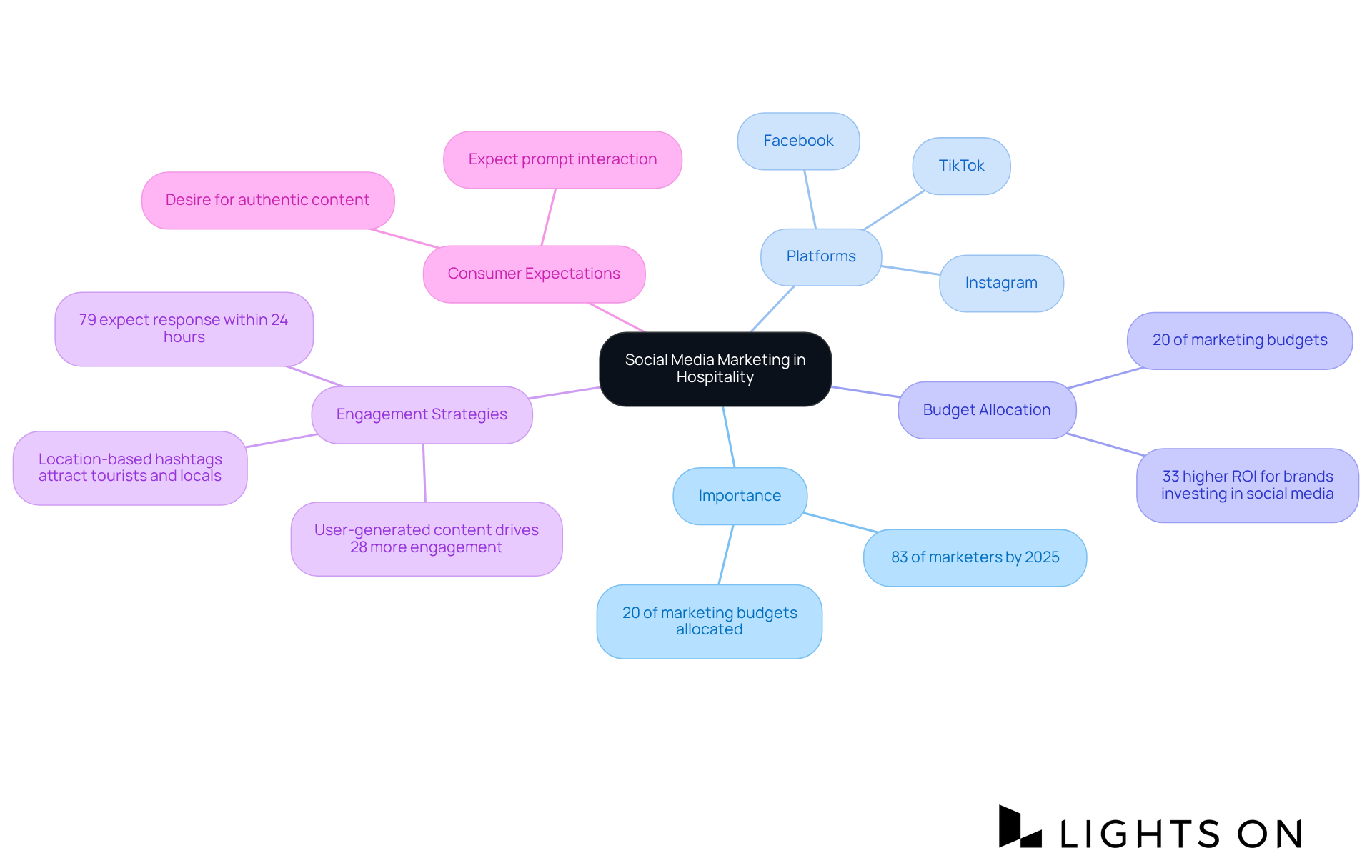
To enhance the effectiveness of online platforms, they must be seamlessly integrated into your overall promotional strategy. This integration involves coordinating online campaigns with email outreach, website content, and offline promotions. For example, consistent branding and messaging across all platforms not only reinforces brand identity but also aids in effectively tracking customer journeys. Furthermore, employing online platform analytics can guide other promotional efforts, ensuring that all channels work together to boost traffic and conversions.
Consider this: brands that allocate more than 20% of their promotional budget to online platforms report a staggering 33% greater ROI compared to those that do not. Moreover, 83% of marketers indicate that online platforms have become their primary customer acquisition channel, underscoring their growing significance. As the landscape evolves, integrating social media marketing for hospitality with other marketing channels will be essential for enhancing hotel marketing efficiency in 2025 and beyond.
Keep in mind that 63% of consumers intend to visit a business following a favorable online interaction, highlighting the profound influence of engagement on consumer behavior. Finally, with 45% of hotel owners acknowledging lost revenue opportunities due to delayed responses, efficient monitoring and prompt interaction on online platforms are not just beneficial - they're crucial.
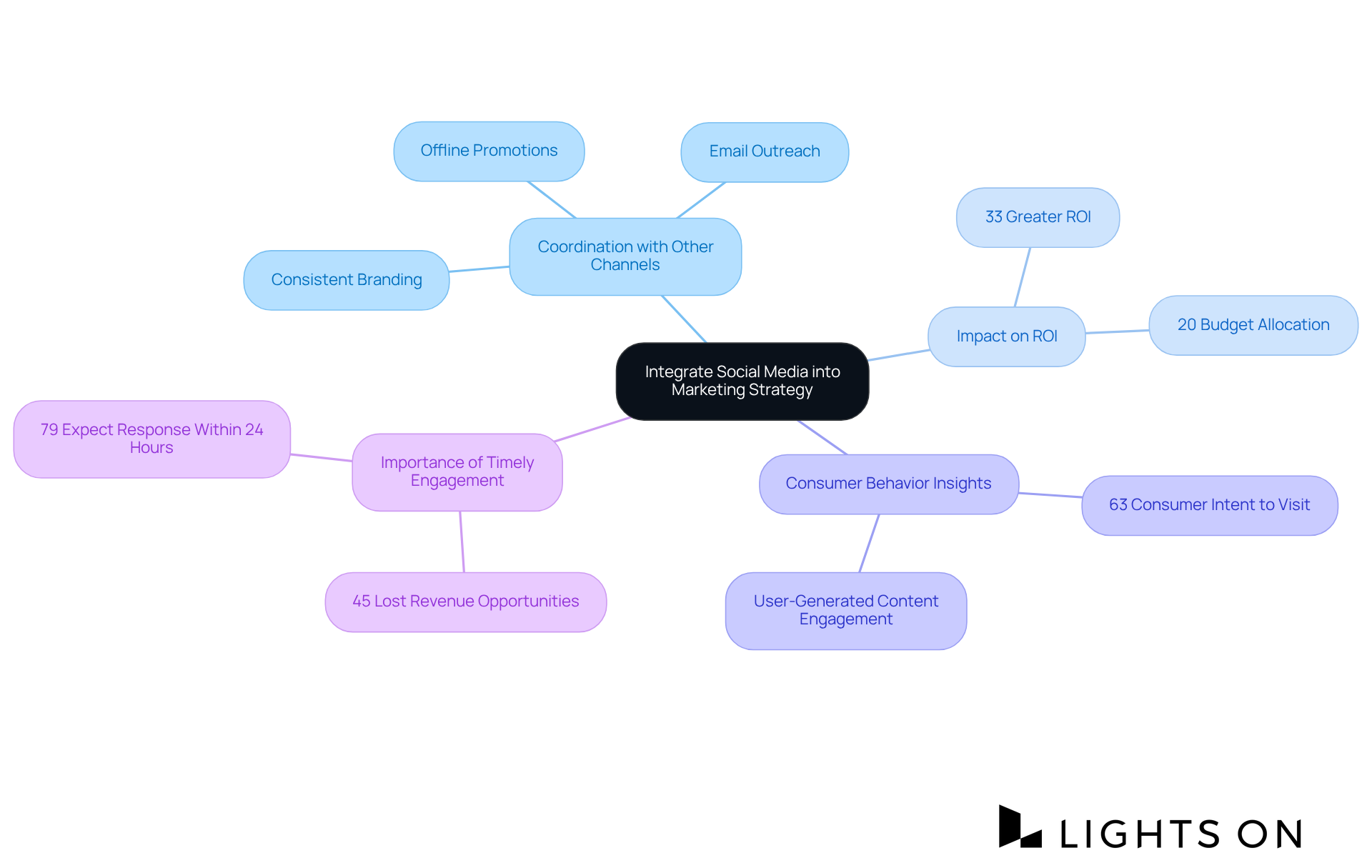
Each social media platform possesses distinct characteristics and caters to different audience preferences. For instance, Instagram thrives on visually captivating content, making it ideal for showcasing stunning images of hotel amenities and dining experiences. In contrast, Twitter excels in providing real-time updates and enabling customer interactions, which can improve involvement through timely responses and promotions.
To maximize effectiveness, develop a comprehensive content plan that specifies the types of content to be shared on each platform. This should incorporate:
Utilizing content calendars can help schedule posts and maintain consistency, ensuring that your messaging resonates with the expectations of each platform's audience.
In 2025, interaction rates fluctuate notably across platforms, with TikTok at the forefront in user activity, closely followed by Instagram and YouTube. By tailoring your approach to each platform's strengths, you can enhance engagement and foster a deeper connection with your audience. As Aishwarya Suresh observes, "AI isn’t merely a trend today; it’s evolving into a strategic engine for speed and precision in promotions," emphasizing the significance of utilizing technology in your content planning.
Ultimately, a well-structured content strategy that utilizes social media marketing for hospitality and aligns with the unique dynamics of Instagram and Twitter will not only boost visibility but also drive customer loyalty and conversions in the competitive hospitality landscape.
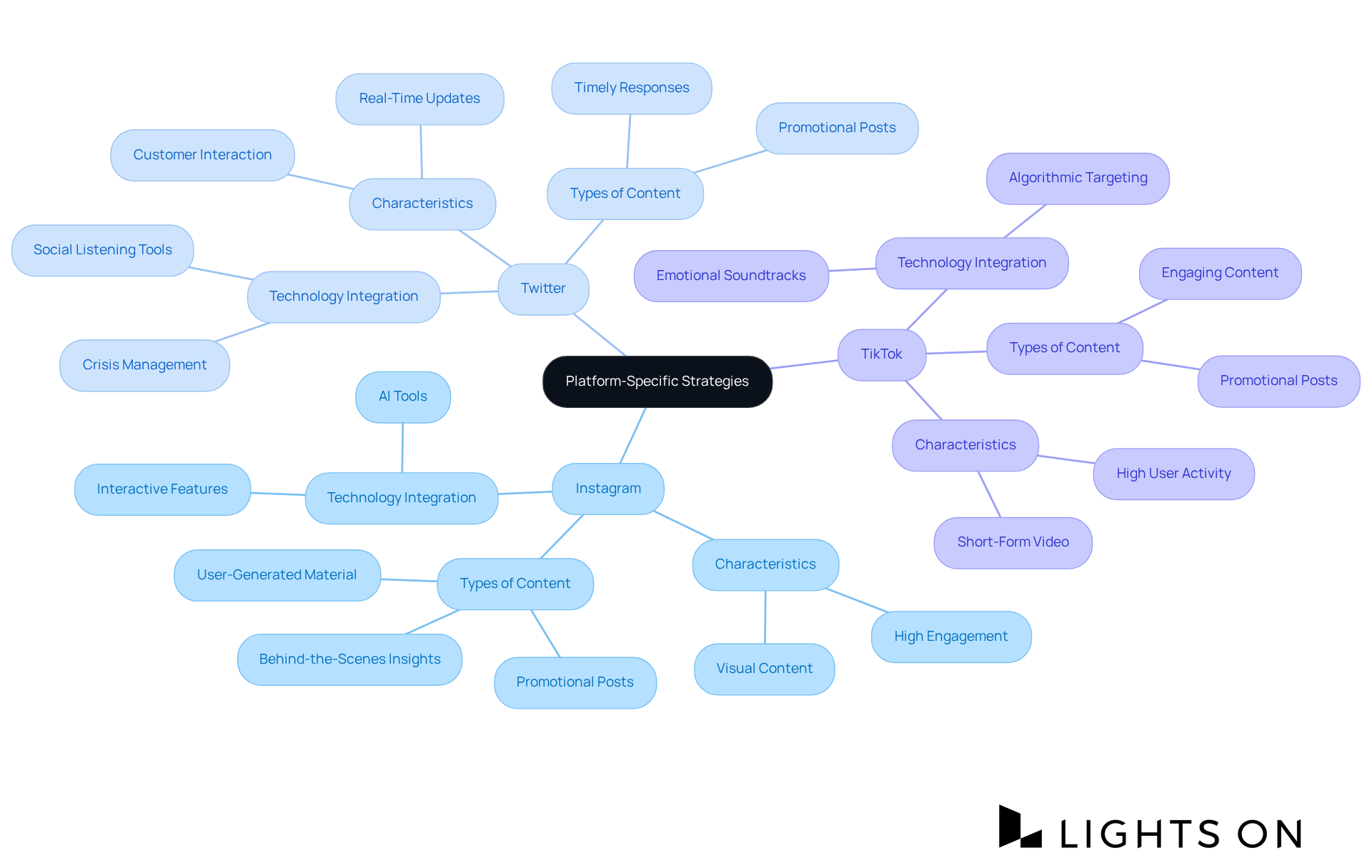
Routine evaluation of online platform performance data is essential for enhancing social media marketing for hospitality efficiency. Consider this: interaction rates average around 3.5% on Instagram, but carousel posts outperform standard images and videos, achieving interaction rates of 1.92%, 1.74%, and 1.45%, respectively. This data highlights the need to track engagement-to-reach ratios, which are crucial for assessing content effectiveness.
Employing tools like Google Analytics and online platform insights can help gather valuable information and identify trends. For instance, if carousel posts yield higher interaction rates, increasing their frequency could lead to better outcomes. Furthermore, sentiment analysis offers insights into audience perception, a vital component for improving customer retention. By consistently monitoring these metrics and adjusting strategies accordingly, hotels can significantly boost their online presence through social media marketing for hospitality, aligning their efforts with broader business objectives.
As investments in online platform analytics continue to rise, focusing on significant interaction metrics rather than superficial ones will be critical for success in 2025.
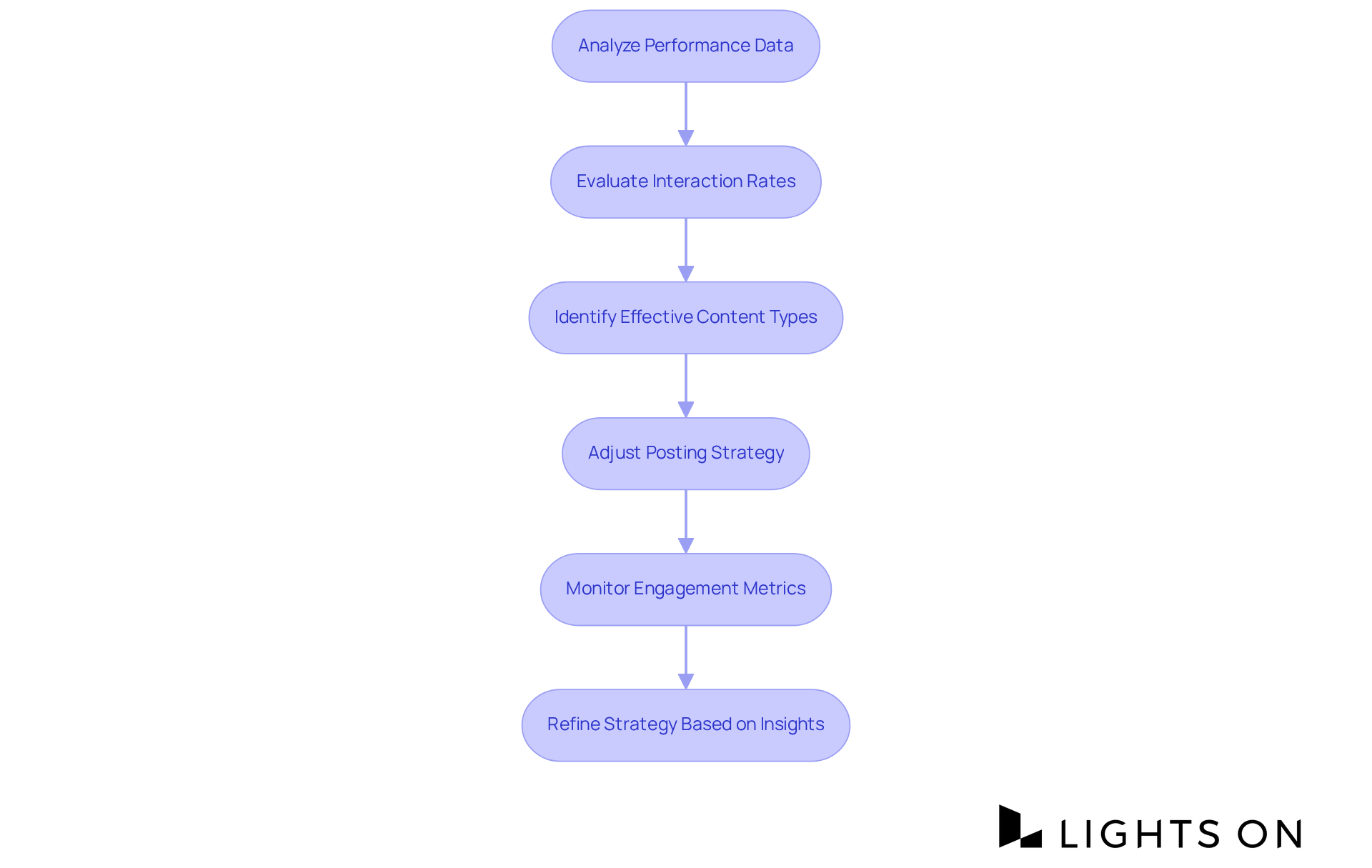
Analyzing successful case studies reveals invaluable insights into effective online marketing strategies. Take, for instance, the Ritz-Carlton's #RCMemories campaign, which encouraged guests to share their experiences. This initiative not only significantly boosted engagement but also fostered brand loyalty. Similarly, Hilton's viral TikTok video showcased their unique offerings, resulting in increased bookings. By examining these examples, hospitality businesses can pinpoint best practices and innovative approaches in social media marketing for hospitality that resonate with their target audience. Ultimately, this analysis can drive their success in social media marketing for hospitality.
Furthermore, understanding these strategies allows hotel and restaurant owners to tackle their marketing challenges head-on, especially with social media marketing for hospitality. What can you learn from these industry leaders? By adopting similar tactics, you can enhance your brand's visibility and engagement. Don't miss the opportunity to leverage these insights for your own marketing efforts.
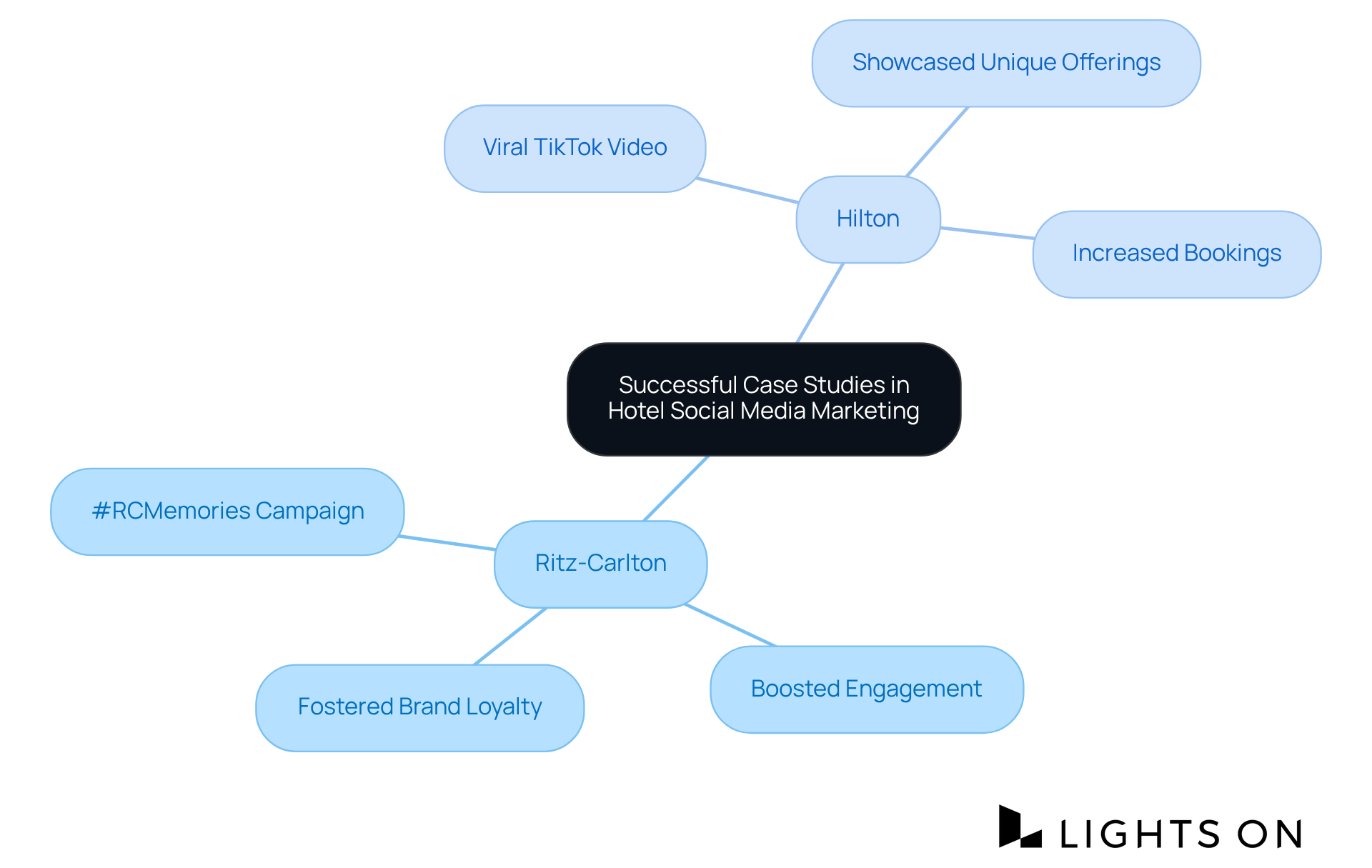
Social media marketing has become a cornerstone for the hospitality industry, offering a dynamic platform for hotels and restaurants to connect with potential guests and foster community engagement. The integration of social media into broader marketing strategies is essential for enhancing brand visibility and driving bookings. By embracing innovative techniques and prioritizing genuine customer interactions, hospitality businesses can forge lasting relationships that translate into loyalty and repeat visits.
Key practices highlighted in this article underscore the importance of:
Utilizing analytics to gauge performance and optimize content will further enhance the effectiveness of social media campaigns. Successful case studies, such as the Ritz-Carlton's #RCMemories and Hilton's viral TikTok efforts, serve as powerful reminders of how strategic engagement can lead to increased visibility and bookings.
As the hospitality landscape continues to evolve, leveraging social media marketing will be pivotal for staying competitive. By implementing these best practices and learning from industry leaders, hospitality businesses can not only improve their marketing outcomes but also strengthen their brand presence in an increasingly digital world. Embracing these strategies will ensure that social media remains a vital tool for connecting with guests and driving success in 2025 and beyond.
Why is social media marketing important for the hospitality industry?
Social media marketing is vital for hospitality as it allows hotels and restaurants to engage with potential guests in real-time, promote unique offerings, share customer experiences, and build a community around their brand.
Which social media platforms are essential for hospitality marketing?
Key platforms for hospitality marketing include Instagram, Facebook, and TikTok, as they facilitate engagement and visibility for businesses.
What percentage of marketing budgets do brands allocate to social media marketing in hospitality?
Brands allocate over 20% of their marketing budgets to social media marketing for hospitality, highlighting its crucial role in overall marketing strategies.
How does user-generated content impact engagement in hospitality marketing?
User-generated content generates 28% more engagement than branded content, making it a powerful strategy for boosting visibility and fostering trust among travelers.
What are consumers' expectations regarding brand responses on social media?
79% of consumers expect a response from brands within 24 hours on online platforms, emphasizing the need for prompt interaction.
How can location-based hashtags benefit hospitality businesses?
Incorporating location-based hashtags can attract both tourists and locals, thereby expanding the reach of hospitality businesses.
What role does Lights On play in social media marketing for hospitality?
Lights On specializes in targeted strategies for the hospitality sector, improving advertising quality and customer loyalty through techniques like remarketing and email targeting.
How should social media be integrated into a hospitality marketing strategy?
Social media should be integrated into the overall promotional strategy by coordinating online campaigns with email outreach, website content, and offline promotions to reinforce brand identity and track customer journeys effectively.
What is the ROI for brands that allocate more than 20% of their budget to online platforms?
Brands that allocate more than 20% of their promotional budget to online platforms report a 33% greater ROI compared to those that do not.
What influence does online engagement have on consumer behavior?
63% of consumers intend to visit a business following a favorable online interaction, indicating the significant impact of engagement on consumer behavior.
What challenges do hotel owners face regarding online interactions?
45% of hotel owners acknowledge lost revenue opportunities due to delayed responses, making efficient monitoring and prompt interaction on online platforms crucial.
Transform your group booking strategies with Lights On and watch your occupancy soar.